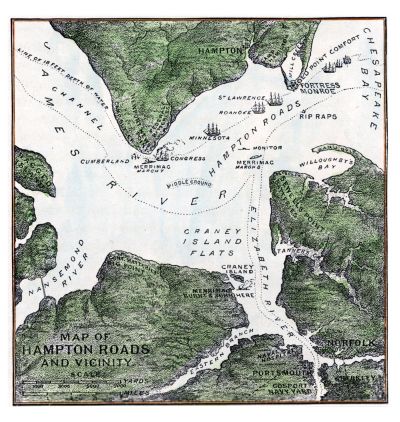 Black Baptists have been well-established in Norfolk and Portsmouth, Virginia since the early nineteenth century. Their vibrant presence is testimony to the acceptance of blacks in Baptist churches, a preponderance of free blacks in the area, and three decades (the 1820s-1850s) as a disembarkation point for African American missionaries traveling to Liberia through the efforts of the American Colonization Association.
Black Baptists have been well-established in Norfolk and Portsmouth, Virginia since the early nineteenth century. Their vibrant presence is testimony to the acceptance of blacks in Baptist churches, a preponderance of free blacks in the area, and three decades (the 1820s-1850s) as a disembarkation point for African American missionaries traveling to Liberia through the efforts of the American Colonization Association.
Now largely discredited among blacks, the ACA had represented an attempt to resolve the problem of African slavery by encouraging the resettlement of blacks in Liberia. Freedom, not resettlement, is now the goal of African Americans.
The Confederacy managed to maintain control of Norfolk and Portsmouth, home to a strategic naval yard, for barely a year into the war; the cities surrendered to Union forces in May 1862. Immediately, slaves began fleeing from the nearby countryside to freedom behind Union lines.
Court Street Baptist Church is the oldest Baptist church in the area, having been founded in 1798 as Portsmouth Baptist Church and renamed in 1855. As with most other Baptist churches in the antebellum South, church membership includes both white and black members. Despite Baptists’ tradition of spiritual equality among members, black members, whether free or enslaved, have limited rights and are supervised by whites (a typical practice among Baptist churches of the South).
With Portsmouth in Union hands by late spring of 1862, many of the city’s churches are soon turned into Union hospitals. Such is the case with the Court Street meeting house, whose services are thus disrupted.
At the same time, the war serves to further heighten tensions between white and black members of the Court Street congregation. This month, one year following the Emancipation Proclamation, seven black members of Court Street withdraw from the church and began holding prayer meetings. Their departure is not approved by the white members of Court Street, but there is little that can be done to prevent the seven back members from acting on their growing sense of freedom.
For the remainder of the year the little group meets, holding regular prayer services. Led by Rev. John W. Godwin, a former black deacon among the colored members of the Court Street congregation, in January 1865 the seven obtain use of the town’s Temperance Hall and establish the First Colored Baptist Church of Portsmouth.
Following the ending of the war four months later, the little group grows quickly, soon necessitating another meeting place. The use of Sneed’s Blacksmith Shop is then secured, and the name of the church changed to Ebenezer Baptist Church. In 1871, the congregation acquires its first building by purchasing the Wesley Chapel Methodist Church building.
Many years later, following much growth and involving several new church facilities, the Ebenezer Baptist Church remains a vibrant congregation to the present day.
Sources: Race, Time, Place: African Americans in Tidewater, Virginia – Religion (link); Court Street Baptist Church Historical Marker (link); History, Ebenezer Baptist Church (link)


